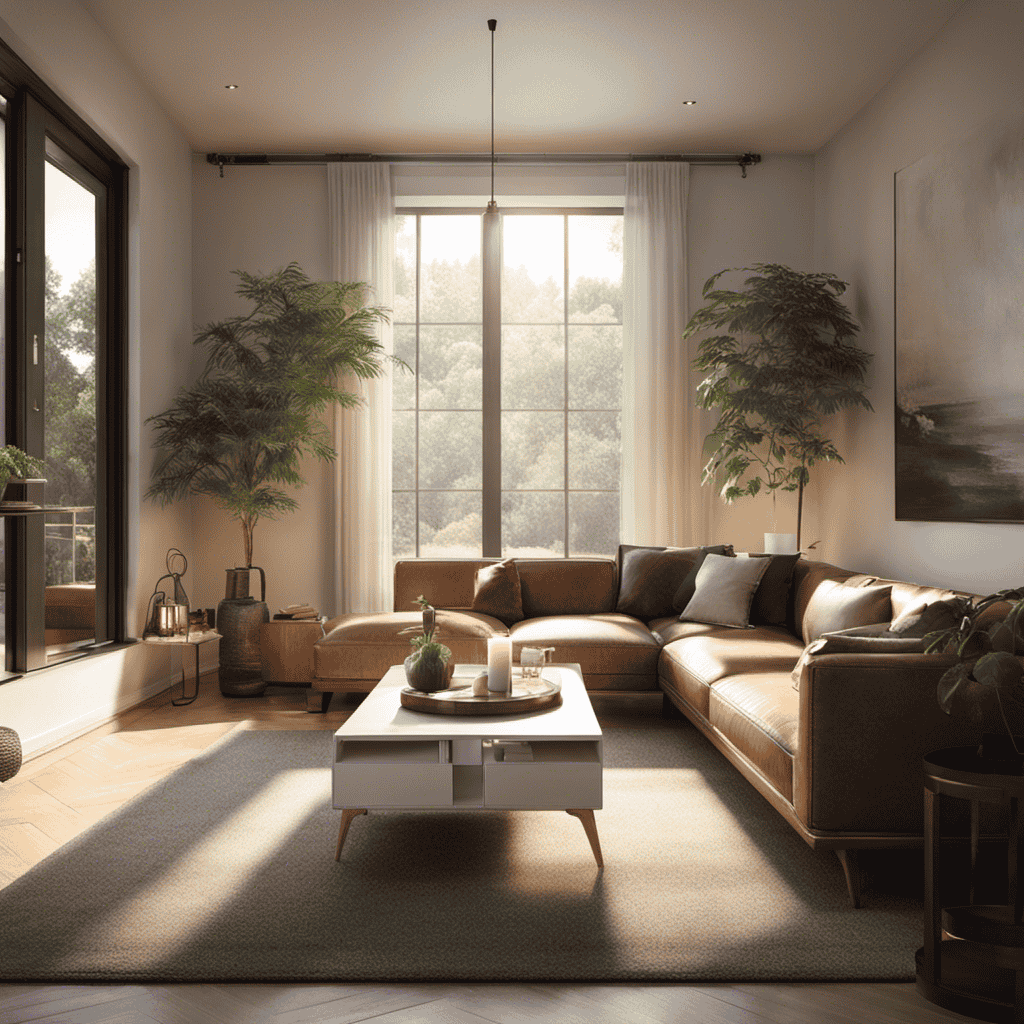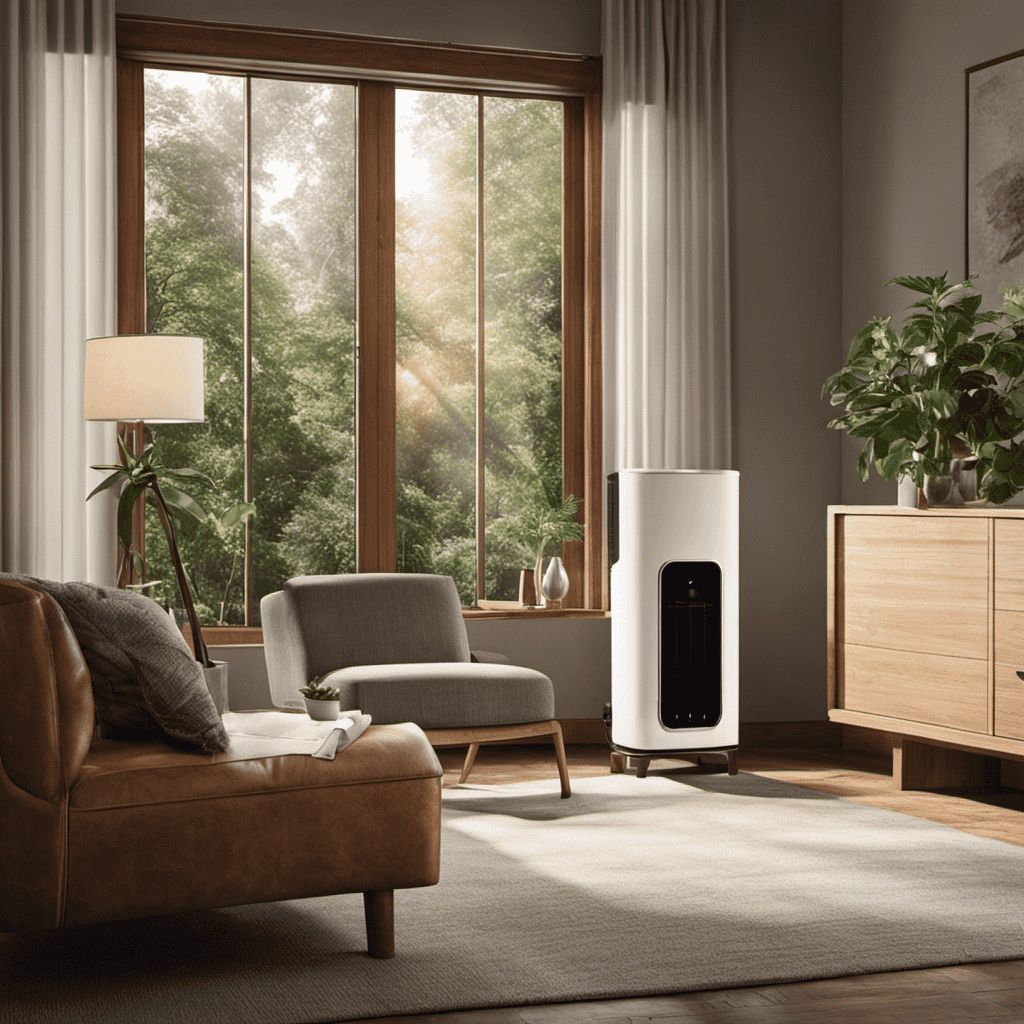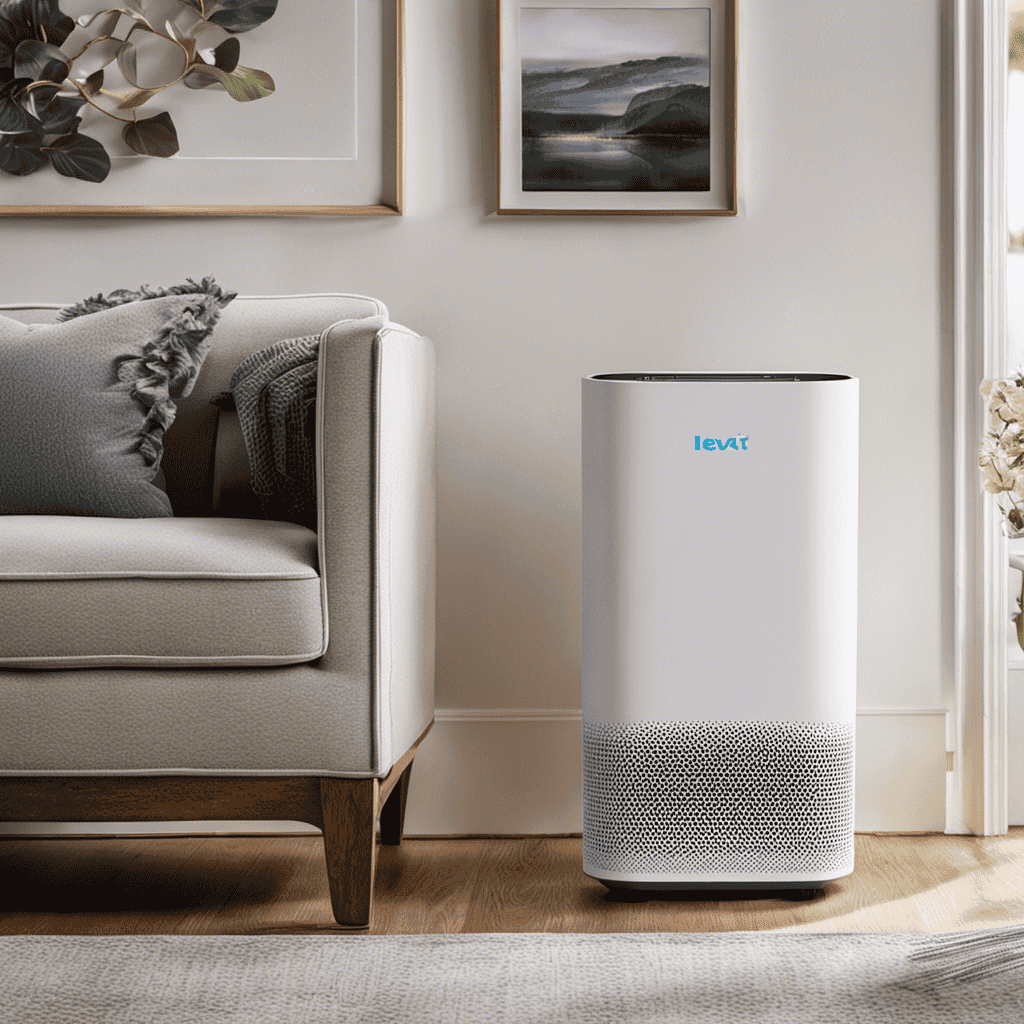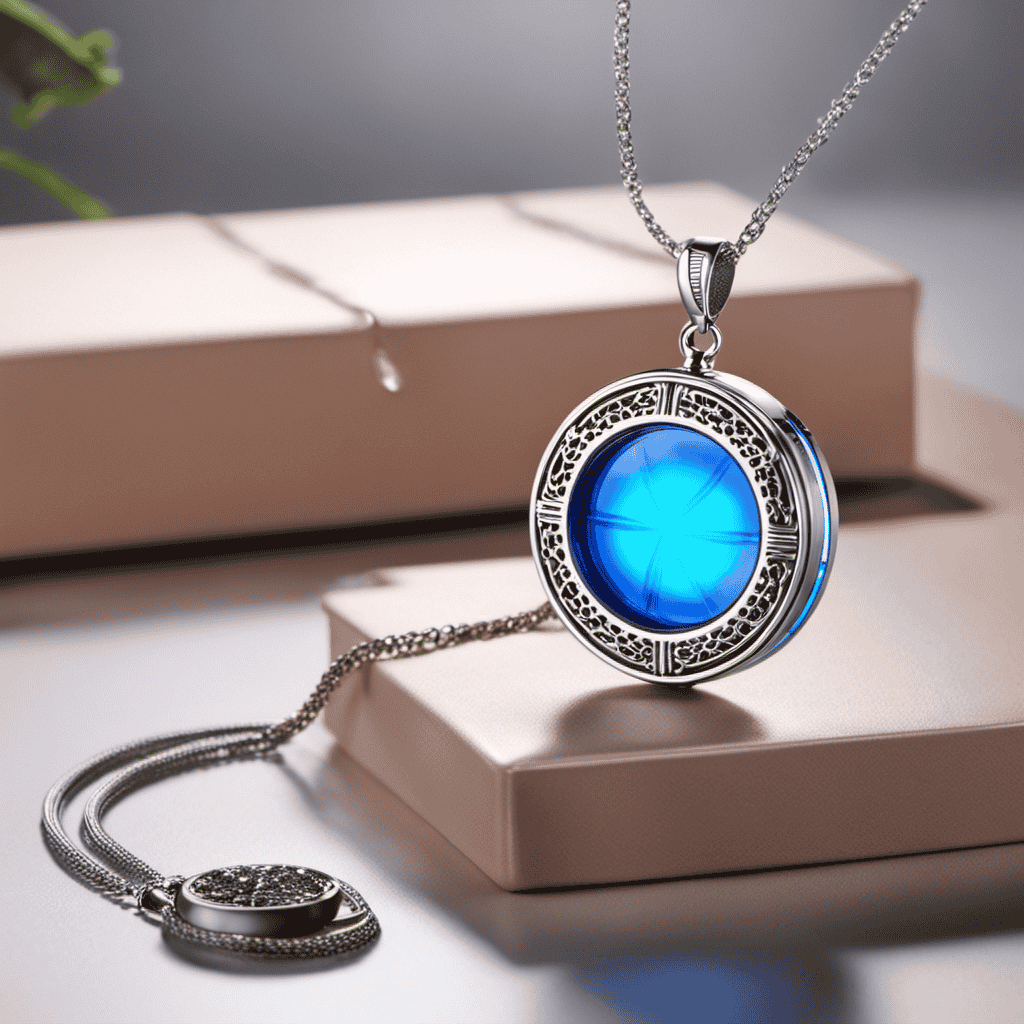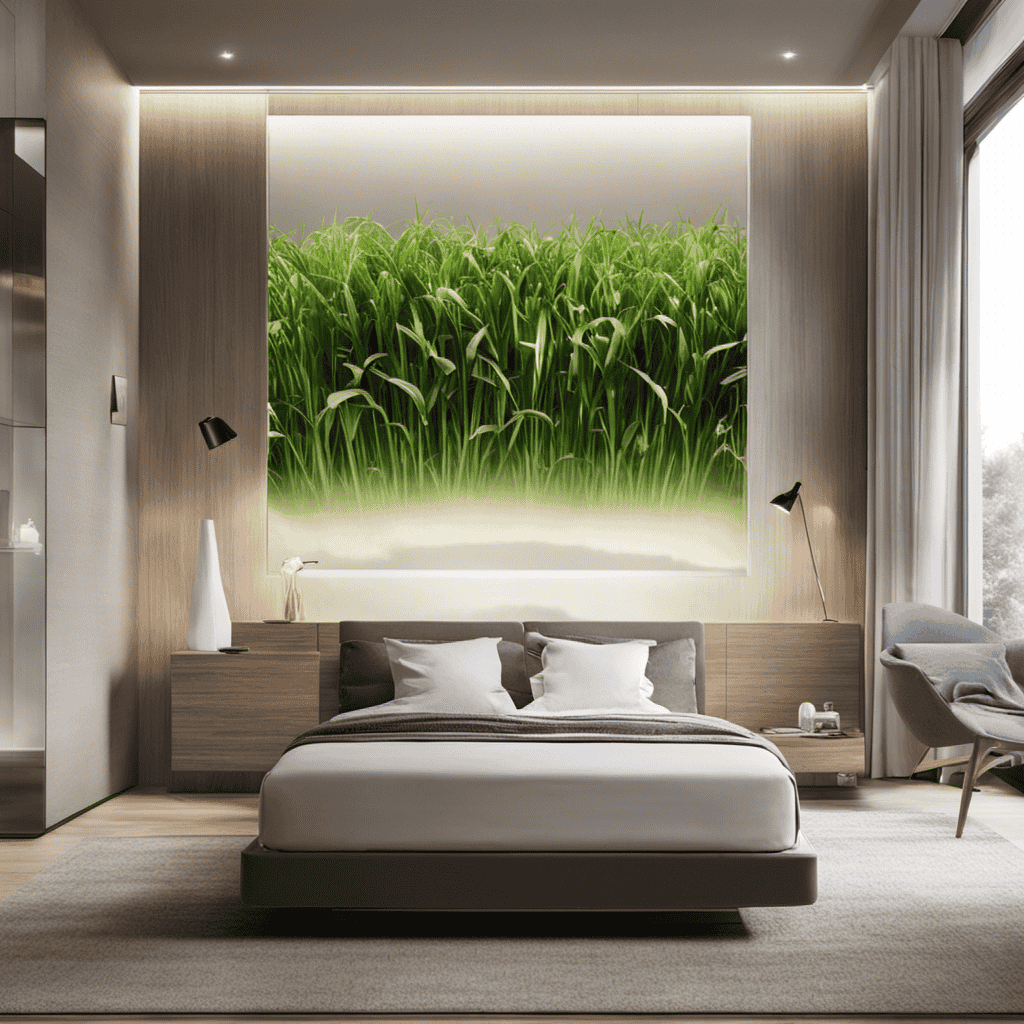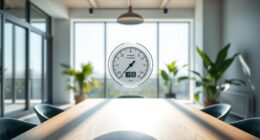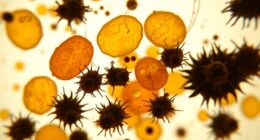I’ve always been curious about the optimal duration for running my air purifier to maintain clean and fresh air in my home. This is a common question with a variable answer depending on different factors.
In this article, we’ll dive into the research-backed recommendations, considering factors like air quality monitoring, allergy and asthma relief, energy efficiency, noise levels, and maintenance.
By the end, you’ll have a clear understanding of how long you should keep your air purifier running, tailored to your personal preference.
Key Takeaways
- The recommended operating time for an air purifier is a few hours each day.
- Running the purifier for a few hours each day reduces indoor air pollution, controls odors and chemicals, and improves sleep quality.
- Determining the optimal monitoring frequency for air quality is crucial, and real-time data accuracy is essential.
- Running the purifier continuously can provide allergy and asthma relief, with long-term benefits including improved respiratory function and decreased risk of asthma attacks.
Factors to Consider
When deciding how long to keep your air purifier on, you should consider factors such as the size of your space and the air quality in your area.
The recommended duration for running an air purifier varies depending on these factors. In general, for smaller spaces with good air quality, running the purifier for a few hours a day should suffice.
However, if you have a larger space or live in an area with poor air quality, it is advisable to run the air purifier continuously or for longer periods of time. This will ensure that the air in your space is consistently clean and free from pollutants.
Neglecting to run your air purifier for an adequate duration can have health implications, as it may not effectively filter out harmful particles and allergens. Therefore, it is important to consider these factors and follow the recommended duration to maintain a healthy living environment.
Recommended Operating Time
To ensure optimal performance, it’s recommended that you run the air purifier for a few hours each day. This duration is sufficient to effectively clean the air in your living space and maintain a healthy environment.
Here are three reasons why the recommended duration is important for your health:
-
Reduces indoor air pollution: Running the air purifier for a few hours every day helps to continuously filter and remove pollutants such as dust, pet dander, pollen, and mold spores from the air. This reduces the risk of respiratory issues and allergies.
-
Controls odors and chemicals: Air purifiers with activated carbon filters can effectively remove unpleasant odors and harmful volatile organic compounds (VOCs) from the air. Regular use ensures a fresh and clean-smelling environment.
-
Improves sleep quality: Air purifiers can help create a conducive sleeping environment by reducing allergens and pollutants that may disrupt sleep. Breathing clean air during sleep promotes better rest and overall well-being.
Air Quality Monitoring
When it comes to monitoring air quality, there are several key points to consider.
First, determining the optimal monitoring frequency is crucial in order to effectively track any changes and address potential air quality issues promptly.
Additionally, ensuring real-time data accuracy is essential for making informed decisions about air quality interventions.
Lastly, choosing suitable monitoring devices that align with your specific needs and budget is a vital step in maintaining a healthy indoor environment.
Optimal Monitoring Frequency
You’ll want to regularly monitor the air quality in your space to determine the optimal frequency for running your air purifier. This will ensure that you are using your air purifier efficiently and effectively, while also prolonging its lifespan.
Here are some factors to consider when determining the monitoring frequency:
-
Air Purifier Lifespan:
-
Check the manufacturer’s recommendations for the lifespan of your air purifier. This can give you an idea of how often you should monitor the air quality.
-
Keep track of the usage hours of your air purifier. If you use it frequently in an area with poor air quality, you may need to monitor more often.
-
Air Purifier Effectiveness:
-
Monitor the air quality before and after running your air purifier. This will help you gauge how effective it is at removing pollutants.
-
Pay attention to any symptoms of poor air quality, such as allergies or respiratory issues. If these persist, you may need to increase the frequency of monitoring.
-
Environmental Factors:
-
Consider the surrounding environment. If you live in an area with high pollution levels or if there are specific triggers for poor air quality, you may need to monitor more frequently.
Real-Time Data Accuracy
For accurate real-time data, regularly monitor the air quality in your space using your device. Real-time data collection is crucial for ensuring accurate analysis of air quality. By continuously monitoring the air in your environment, you can track the changes in pollutant levels and take necessary actions to improve air quality. To illustrate the importance of real-time data collection, here is a table showcasing the potential variations in air quality over a 24-hour period:
| Time | PM2.5 | CO2 | VOCs | AQI |
|---|---|---|---|---|
| 8:00 AM | 15 | 400 | 30 | 50 |
| 12:00 PM | 25 | 600 | 40 | 75 |
| 4:00 PM | 35 | 800 | 50 | 100 |
| 8:00 PM | 20 | 500 | 35 | 60 |
As you can see, pollutant levels can fluctuate throughout the day, highlighting the need for real-time monitoring. To ensure data analysis accuracy, it is essential to choose suitable monitoring devices that provide reliable and precise measurements.
Choosing Suitable Monitoring Devices
To accurately monitor the air quality in your space, it’s important to select monitoring devices that provide reliable and precise measurements. The market offers a wide range of suitable technologies to choose from, each with its own strengths and weaknesses.
Here are three key factors to consider when selecting monitoring devices:
-
Sensor accuracy: Look for devices that utilize advanced sensor technology to ensure accurate measurements of various air pollutants such as particulate matter (PM2.5, PM10), volatile organic compounds (VOCs), carbon dioxide (CO2), and more.
-
Connectivity options: Opt for devices that offer wireless connectivity, allowing you to monitor air quality in real-time from anywhere using your smartphone or computer. This feature enables you to take immediate action if the air quality deteriorates.
-
Data visualization: Consider devices that provide clear and intuitive data visualization, such as charts and graphs, to help you easily interpret and analyze air quality trends over time.
Allergy and Asthma Relief
When it comes to allergy and asthma relief, understanding the optimal usage of an air purifier is crucial.
Research has shown that running an air purifier continuously, especially in the bedroom, can significantly reduce allergens and irritants in the air, leading to a decrease in symptoms.
Moreover, the long-term health benefits of using an air purifier consistently include improved respiratory function and a decrease in the risk of asthma attacks.
Optimal Purifier Usage
You should consider keeping the air purifier on for at least 4-6 hours a day to ensure optimal usage.
Here are some recommended purifier settings and tips to evaluate its effectiveness:
-
Set the purifier to the highest fan speed: This will ensure maximum air circulation and filtration, especially during peak pollution hours.
-
Place the purifier in the most frequently used room: This will help target the area where you spend the most time, ensuring you breathe clean air consistently.
-
Monitor the air quality index (AQI) regularly: Use a reliable air quality monitor to assess the indoor air quality. If the AQI remains within healthy levels, it indicates that the purifier is doing its job effectively.
Impact on Symptoms
When it comes to managing my symptoms, I’ve found that treatment options and environmental factors play a significant role. While an air purifier can help improve indoor air quality, it’s important to consider how long to keep it on for maximum effectiveness. Research suggests that running an air purifier continuously can provide the most benefits, especially for individuals with allergies or respiratory conditions. However, it’s also important to consider energy usage and cost. To help you better understand the impact of air purifier usage, here’s a table outlining the recommended duration based on different environmental factors:
| Environmental Factors | Recommended Duration |
|---|---|
| High Pollution Levels | Continuous usage |
| Allergen-Heavy Areas | Continuous usage |
| Mild Pollution Levels | 8-10 hours per day |
| Low Pollution Levels | 4-6 hours per day |
Long-Term Health Benefits?
To maximize the health benefits, it’s important to consider the impact of continuous usage of an air purifier. Scientific studies have shown that using an air purifier regularly can have long-term effects on our health. Here are some key findings:
-
Reduction in respiratory issues: Long-term usage of air purifiers has been linked to a decrease in respiratory problems such as allergies, asthma, and lung infections.
-
Improved sleep quality: Research suggests that clean air provided by air purifiers can help improve sleep quality, leading to better overall health and well-being.
-
Decreased risk of cardiovascular diseases: Air purifiers can filter out harmful pollutants, which can reduce the risk of heart disease and other cardiovascular conditions.
Incorporating an air purifier into your daily routine can provide long-lasting health benefits. However, it’s also important to consider the energy efficiency of the device to ensure optimal usage and minimize environmental impact.
Energy Efficiency
If you’re concerned about energy efficiency, it’s important to consider how long to keep your air purifier on. The energy consumption of an air purifier depends on its size, filtration system, and fan speed settings. Generally, running an air purifier continuously can consume a significant amount of energy, leading to higher electricity bills. To maximize cost-effectiveness, it’s recommended to use the air purifier only when needed.
For example, if you’re not at home during the day, turning off the purifier can help reduce energy consumption. Additionally, using the purifier in the room where you spend the most time can be more efficient than running it in every room of the house. By considering energy consumption and cost effectiveness, you can strike a balance between clean air and efficient use of resources.
When it comes to noise level considerations…
Noise Level Considerations
When it comes to air purifiers, noise level is an important consideration, especially if you plan on using it during the night while you sleep. The placement of your air purifier can have a significant impact on its noise level.
Here are some key points to keep in mind:
- Distance: Place the air purifier at least 6-10 feet away from your bed to minimize any sleep disturbance.
- Furniture: Avoid placing the air purifier on or near furniture that can vibrate or amplify the noise.
- Obstructions: Keep the air purifier away from walls or other objects that may obstruct airflow and cause the unit to work harder, resulting in more noise.
By strategically placing your air purifier, you can reduce the noise level and ensure a peaceful night’s sleep.
Now, let’s move on to the next section where we’ll discuss maintenance and filter lifespan.
Maintenance and Filter Lifespan
Regular maintenance is necessary to ensure the longevity of your air purifier’s filters. It is important to follow a maintenance schedule to keep your air purifier running efficiently.
One crucial aspect of maintenance is changing the filters regularly. The frequency at which you should change the filters depends on several factors, such as the type of air purifier you have and the level of pollutants in your environment. Generally, it is recommended to change the filters every 3 to 6 months. However, it is essential to check the manufacturer’s instructions for specific guidelines.
Regularly changing the filters not only improves the air purifier’s performance but also helps to maintain good indoor air quality. It is a simple yet crucial step in keeping your air purifier running effectively.
Personal Preference
To determine the best air purifier for you, consider your personal preferences and specific needs.
When it comes to personal preference, there are a few factors to consider. First, think about the size of the room you want to purify. If you have a small bedroom, a compact air purifier might be sufficient. On the other hand, if you have a large living room or an open floor plan, you’ll need a more powerful purifier.
Secondly, think about the noise level. Some people prefer whisper-quiet purifiers, while others don’t mind a bit of white noise.
Lastly, consider the design and aesthetics. Do you want a purifier that blends seamlessly with your decor, or do you prioritize functionality over appearance?
Ultimately, choosing an air purifier that aligns with your personal preferences and health concerns will ensure that you breathe clean and healthy air.
What Is the Recommended Duration for Using an Air Purifier?
The recommended duration for keeping air purifier running depends on factors such as the size of the room and the level of air pollution. Generally, it is advised to run the air purifier 24/7 for continuous air purification, especially in spaces with high traffic or indoor air quality issues.
Frequently Asked Questions
Can I Leave the Air Purifier on Overnight?
Sure, you can leave the air purifier on overnight. It helps to keep the air clean and removes allergens, dust, and pollutants. I find it beneficial to use it while at work too.
Is It Safe to Use an Air Purifier in a Small, Closed Room?
Using an air purifier in a small, closed room is generally safe. However, it’s important to consider factors like the size of the room and the air quality. It’s best to follow manufacturer recommendations and ensure proper ventilation.
How Often Should I Clean the Air Purifier and Its Filters?
Cleaning the air purifier and its filters regularly is crucial. The cleaning frequency depends on factors like usage and air quality. Neglecting maintenance can reduce its effectiveness and increase maintenance costs in the long run.
Can an Air Purifier Remove Odors From Cooking or Smoking?
I find that an air purifier is effective in removing odors from cooking or smoking. It’s one of the many benefits of using an air purifier.
Will an Air Purifier Help With Pet Allergies?
Using an air purifier can help with pet allergies by removing pet dander and other allergens from the air. For best results, follow air purifier maintenance tips and keep it on continuously to reap the benefits.
Conclusion
In conclusion, the decision of how long to keep an air purifier on ultimately depends on various factors.
Symbolically speaking, the air purifier acts as a guardian, tirelessly working to provide clean and fresh air for our well-being.
By considering factors such as air quality monitoring, allergy relief, energy efficiency, noise levels, and maintenance, we can ensure optimal performance.
Ultimately, it is a personal preference, but with research-based information and practicality in mind, we can make informed decisions to create a healthier environment for ourselves.
